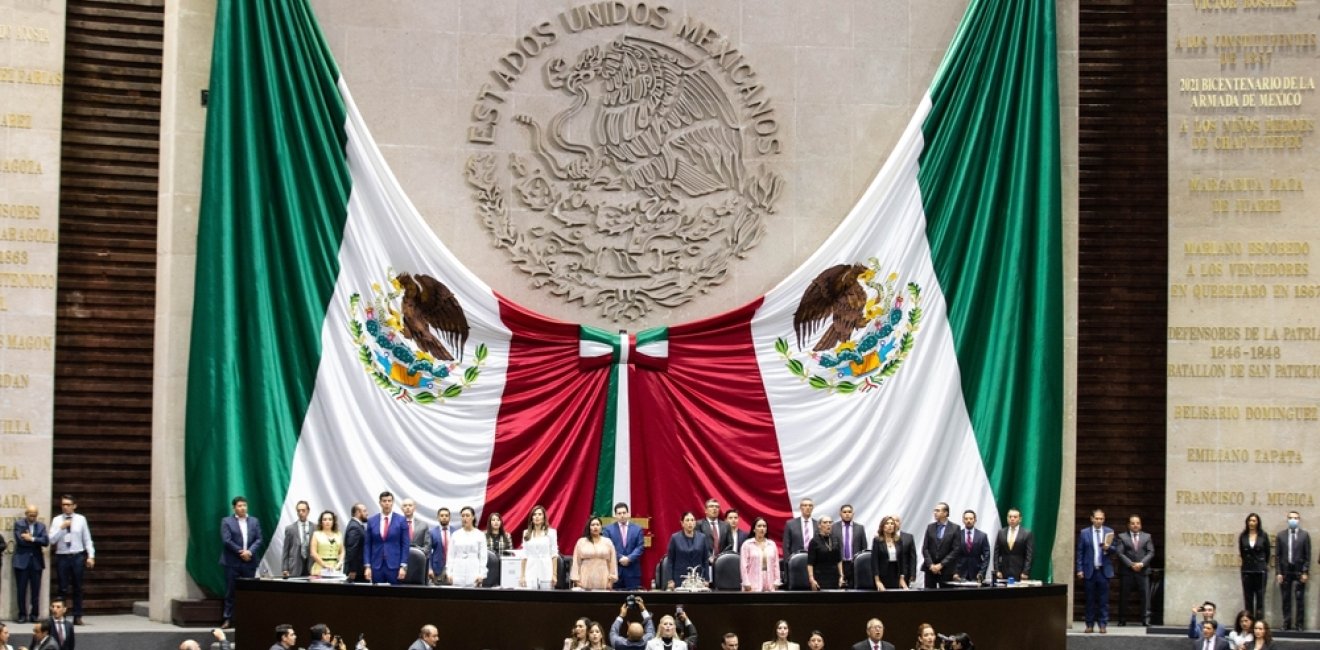
Mexico is living its darkest hour since 1994. This week, the new Congress is about to pass in the Lower House a radical constitutional amendment proposal that aims at overhauling the judiciary by replacing all of its more than 1500 federal judges and select its new members in an extraordinary election in 2025.[1]
This is the most regressive amendment proposal since the 19th century and entails a series of consequential predicaments not only to the legal profession but also to the United States and Canada as Mexico’s closest trade partners within the USMCA.
The governing coalition holds a qualified majority in the Lower House and is just one vote short in the Senate to pass the amendment proposal and in light of this daunting scenario it is worth inquiring if the amendment powers are limitless in Mexico.
It is widely known that since 1921, Mexico’s Constitution has been amended 770 times through 257 decrees of amendment.[2] Anything can be amended and there is no such thing as explicit constitutional unamendability[3] in Mexico. It is one of the most amended constitutions in the world, making it one of the most disharmonic and dysfunctional constitutional texts in comparative perspective,[4] requiring the Supreme Court to clarify and resolve the constant contradictions and antinomies that result from each constitutional amendment and the rest of the existing legal framework.[5] However, the Court has also established an enduring precedent preventing itself from scrutinizing the constitutionality of amendments to the constitution based upon the theory of delegation and deference to the reformative power of the constitution, entrapping the Court in the vicious circle of pouvoir constituant and pouvoir constitué, as Hannah Arendt has described.[6]
And yet, there is no precedent of a more destructive amendment proposal that the one that is about to pass in Congress. Its unprecedented character requires the Court to revisit its existing jurisprudence because an unhindered political majority is about to destroy the very essence of the constitution[7] as explained below:
In the 1990s, Mexico experienced a flourishing period of political liberalization based on two distinctive institutional transformations that were duly predicated at a constitutional level: (i) the incorporation of judicial review making the Supreme Court a fully fledged constitutional tribunal, and (ii) the creation of an independent electoral authority to organize and qualify elections. These reforms put Mexico in line with the paradigm of contemporary liberal democracies after more than seventy years of a single-party rule. This transition to democracy was rubricated by a consequential constitutional amendment on human rights in 2011 that incorporated treaties and conventions of the international system for the protection of human rights at a constitutional level making human dignity and its protection an essential feature of our constitutional arrangement.[8]
The present amendment proposal is designed to obliterate these three columns of Mexico’s constitutional identity by concentrating more power in the Executive branch, minimizing the role and operation of the judiciary and taking control of elections. Therefore, this is not a regular amendment -that is characterized by changing a constitutional provision without breaking the coherence and continuity of the constitutional text, but rather a constitutional replacement that is altering the basic features of its structural and operational design,[9] implying that the reformative power of the constitution is not fulfilling its fiduciary duty towards the constitution but on the contrary, is acting against the constitution itself merely based on its democratic legitimacy.
Arendt underscores that “The great significance of constitutions [is that] they were framed with the express and conscious intention to prevent [the] procedures of majority decisions from generating into the ‘elective despotism’ of majority rule.”[10]
Alas, Mexico is installed in an elective-despotism-of-majority-rule mode and it requires the Supreme Court to protect the Constitution with new interpretative approaches: one thing is to amend the constitution and another is to replace it. There is an array of sources from comparative constitutionalism that shed light on the way in which courts around the world have articulated a basic structure doctrine to save the constitution from utter obliteration.[11] It is in this darkest hour that Mexico’s Supreme Court will face this dilemma to prevent its own demolition.
It is clear that the Court lacks the popular support that the governing coalition enjoys, but at the same time, there is a growing social movement mainly led by university students around the country supporting the judiciary and challenging this power grab that is also undermining the legal profession.[12] Legal protection of foreign investment and the protection of human rights are at risk and multiple defaults within the framework of the USMCA are in the horizon. Clearly, there is a lot at stake and it seems that the Supreme Court may be the last resort against this imminent catastrophe. Hence, if not the Court, who? And if not now, when?
[1] For a detailed explanation on this, see https://www.nytimes.com/2024/08/28/world/americas/mexico-judicial-changes-analysis.html
[2] Francisca Pou-Giménez & Andrea Pozas-Loyo, ‘The Paradox of Mexican Self-Reinforcing Hyper-Reformism,’ in Richard Albert, Carlos Bernal & Juliano Zaiden Benvindo (eds), Constitutional Change and Transformation in Latin America, Hart (2019).
[3] Yaniv Roznai, Unconstitutional Constitutional Amendments. The Limits of Amendment Powers, Oxford University Press, at 15-38 (2017).
[4] Richard Albert, Constitutional Amendments. Making, Breaking, and Changing Constitutions, Oxford University Press, at 251-254 (2019).
[5] Andrea Pozas-Loyo, Camilo Saavedra-Herrera, & Francisca Pou-Giménez, ‘When Lore Leads to More: Constitutional Amendments and Interpretation in Mexico 1917-2020,’ Law & Social Inquiry, Volume 48, Issue 2, 689 (2023).
[6] Hannah Arendt, On Revolution, Penguin Classics, at 157 (2006).
[7] This is explored in more detail in Jaime Olaiz-González, A Minute to Midnight: On the Necessity of Defining a Basic Structure of Mexico’s Constitution and the Role of the Supreme Court in such an Undertaking. History, Methodology, and Models, Paper presented in the Work-in-Progress Seminar at The Kellogg Institute of International Politics of the University of Notre Dame, May 2024 (In progress).
[8] I explore this interesting transformative period in Jaime Olaiz-González, Policy-oriented Jurisprudence and Constitutive Process in Mexico: Toward a Public Order of Human Dignity in Turbulent Times, in Reisman, Michael and Pati, Roza (eds.), Human Flourishing: The end of Law. Essays in Honor of Siegfried Wiessner, Brill (2023). See also Stephen Zamora and José Ramón Cossío, ‘Mexican Constitutionalism after Presidencialismo’ (2006), 4 International Journal of Constitutional Law 411, https://papers.ssrn.com/sol3/papers.cfm?abstract_id=903443; and Héctor Fix-Fierro, ‘Judicial Reform and the Supreme Court of Mexico: The Trajectory of Three Years’ (1998), 6 United States – Mexico Law Journal 1, https://digitalrepository.unm.edu/cgi/viewcontent.cgi?article=1107&context=usmexlj
[9] Richard Albert, Constitutional Amendments. Making, Breaking, and Changing Constitutions, Oxford University Press, at 6-7, 91-92 (2019).
[10] Hannah Arendt, On Revolution, Penguin Classics, at 156 (2006).
[11] Yaniv Roznai, Unconstitutional Constitutional Amendments. The Limits of Amendment Powers, Oxford University Press, at 39-47 (2017). See also Richard Albert, Constitutional Amendments. Making, Breaking, and Changing Constitutions, Oxford University Press, at 149-156 (2019).
[12] See https://elpais.com/mexico/2024-09-01/los-estudiantes-de-derecho-contraprograman-el-informe-de-lopez-obrador-con-una-marcha-contra-su-reforma-judicial.html
Author




